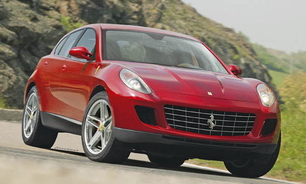Ferrari said to plan 'utility vehicle' to double profit

The final five-year plan under CEO Sergio Marchionne, who is set to retire in 2021, will target boosting annual deliveries beyond a self-imposed limit of 10,000 cars, which allows the company to operate with less-stringent fuel-economy rules, said the people, who asked not to be identified because the matter is private.
Among projects being evaluated is a four-seat family car that offers more space than Ferrari's current two-door GTC4Lusso.
The model is internally dubbed the "Ferrari utility vehicle," following Marchionne's previous objections to developing an SUV. The big Ferrari would be targeted at Asian customers, particularly in China, and may alone contribute 2,000 vehicles to annual deliveries, the people said.
Ferrari is studying ways to ensure its sporty style with the new car, which the manufacturer will try to market as a new industry segment rather than as another high-end SUV, following the likes of Maserati, Bentley and Lamborghini, they said. The new auto, which could have two or four doors, is expected to be sold from 2021, the people said. No final decision on the model has been made.
Under the new business plan, which is set to be unveiled in early 2018 and could expose the carmaker to stricter environmental regulations, Ferrari will also build more hybrid models to improve its vehicles' efficiency and woo new wealthy buyers, the people said. A Ferrari spokesman declined to comment.
Since taking charge of Ferrari, Marchionne has been pushing volume, already blowing past an earlier cap of 7,000 cars. While that approach risks diluting the brand's exclusive cachet, the 65-year-old flanked delivery growth with exclusive limited-edition models, such as the $2.1 million LaFerrari Aperta convertible. He's now seeking to dial up that effort to secure Ferrari's independence as the auto industry grapples with the strains of shifting to electric-powered cars.
Ferrari, which reports earnings on Wednesday, is on pace to increase adjusted earnings before interest, taxes, depreciation and amortization more than 14 percent this year to at least 1 billion euros ($1.18 billion). The new strategy is likely to include doubling that figure in five years, the people said.
Ferrari's current target is to boost vehicle sales to 9,000 cars in 2019 from 8,014 in 2016. Analysts at Mediobanca, UBS Group and Sanford C. Bernstein & Co. predict deliveries could jump to as high as 15,000 under a new strategy, which Marchionne hinted he was developing during his first-quarter earnings presentation in May.
The plan poses a risk as raising annual deliveries to more than 10,000 cars a year would push Ferrari beyond its "small vehicle manufacturer" status, which protects it from some U.S. and European fuel-use and emissions rules.
Hybrid expansion
To address those issues, the automaker, which was spun off from Fiat Chrysler Automobiles in 2016, plans to introduce more hybrid vehicles starting in 2019 to help comply with stricter environmental regulations, the people said. Those models, like the current $1.5 million LaFerrari, will be equipped with an electric motor to improve performance and add horsepower, the people said. Ferrari can also pay penalties or buy carbon credits and add those costs to the price of its vehicles, Mediobanca analyst Massimo Vecchio said.
Meanwhile, boosting output could prompt Ferrari to add a second shift to its factory in Maranello, Italy, its only manufacturing site, the people said. The carmaker's executives have had meetings with investors in the past weeks to prepare them for the new strategy, the people said.
Marchionne, who is also CEO of former parent Fiat Chrysler, is set to present his final plans for both carmakers at the beginning of next year. He intends to step down from Fiat in 2019 and Ferrari two years later.


